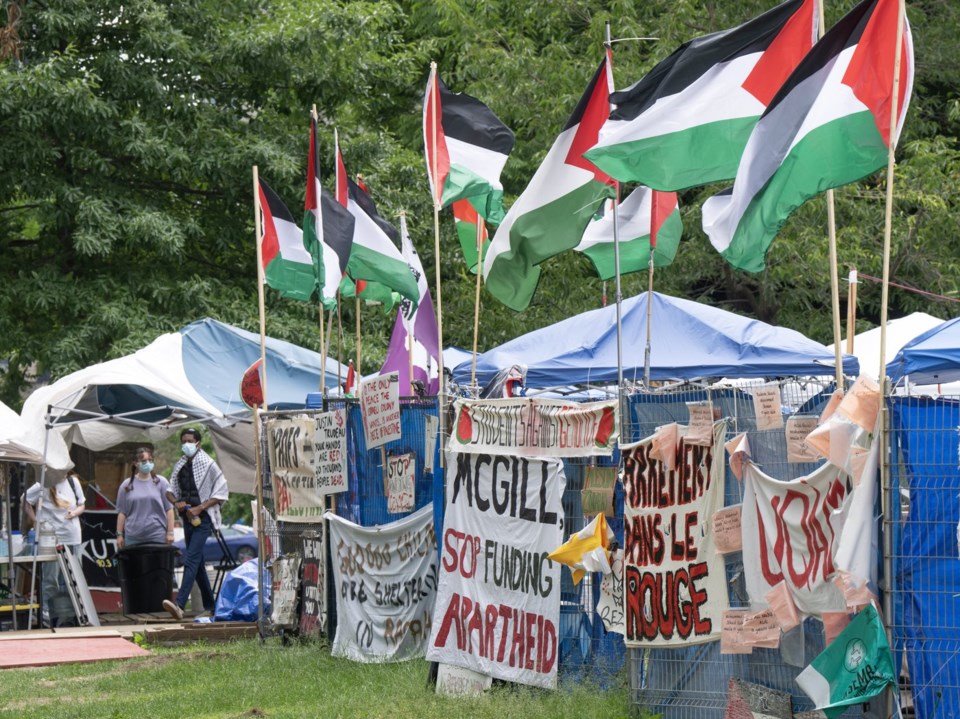MONTREAL — McGill University announced Tuesday it is ending negotiations with pro-Palestinian activists who have occupied the lower field of its downtown Montreal campus since late April.
The university said it is also planning disciplinary action against people participating in the encampment, which could include expulsion of McGill students. The protesters, however, are accusing the university of trying to silence them and say they won't back down.
"Despite our ongoing efforts to discuss in good faith, the representatives of the encampment have maintained that their demands are non-negotiable while accusing the university of unwillingness to engage in fair discussions," McGill president Deep Saini said in a statement.
"As it has become clear that no fruitful outcome will result from these talks, we are ceasing discussions."
Last week, encampment organizers rejected McGill's latest offer, which proposed to explore divesting from weapons manufacturers, to expand investment disclosure to include holdings below $500,000, and to fund students and scholars affected by the crisis in the Middle East.
The protesters, meanwhile, say they won't leave until the university ends its investments connected to Israel's military and cuts ties with Israeli institutions. On Tuesday, encampment spokesperson and McGill student Rama Al Malah said the organizers reached out to McGill on Friday to request a meeting and got no response. She said the university is the "unwilling partner" in the negotiations.
"We will not be silenced and we will not be moved," she told reporters during a news conference. "Our demands have been made clear. We are demanding material steps towards divestment." She dismissed the threat of sanctions from the university as "intimidation tactics."
Saini said the university will move ahead with the measures it proposed to the protesters last week, despite the failure of the negotiations. But McGill had also offered amnesty to students and staff participating in the encampment, which is now off the table. "As our proposal was rejected, the university will pursue disciplinary processes against individuals participating in the encampment to the full extent outlined in our policies," the statement reads.
Sanctions against McGill students participating in the encampment will be decided on a case-by-case basis, but could include expulsion from the university, said Fabrice Labeau, McGill's vice-president of administration and finance. The university could also launch disciplinary procedures against staff or faculty who have been supporting the protesters, he said. McGill says the encampment is an unauthorized occupation of private property.
Labeau said the university will be contacting members of the encampment within "a matter of days to weeks." But he also said McGill still doesn't have a complete picture of who or how many people it's targeting.
"We're talking about individuals who take a lot of effort not to be recognized and are masked all the time," he said. "But we will continue our investigation to make sure that we identify as many as we can."
Michelle Hartman, a professor at McGill's Institute of Islamic Studies who supports the encampment, said she has not heard anything from the university about disciplinary action. "We're genuinely disturbed by how McGill's administration has taken extraordinary measures of repression in this moment where they're being called upon to stand on the side of justice," she told reporters.
The university says the encampment has led to "a series of completely unacceptable incidents" since it began more than 50 days ago. The statement points to the occupation of the university's main administration building by pro-Palestinian protesters earlier this month, which led to 15 arrests.
It also mentions photos of Palestinian resistance fighters holding assault rifles that were used to advertise what protesters called a "revolutionary youth summer program" that began this week at the encampment.
"Despite efforts to reach out and hold discussions with the encampment, these behaviours have only escalated, and have continued to result in substantial costs and disruptions, including the relocation of convocation away from lower field," Saini said.
On Tuesday, Al Malah said that instead of focusing on the photos used to promote the summer program, people should instead focus "on the fact that our administration is investing in real guns and real weapons that are currently perpetrating massacres and violence."
Last month, a Quebec judge denied an injunction request from McGill, saying the university had failed to demonstrate an urgent need to dismantle the camp. The university is now seeking an interlocutory order to evict the protesters, with the next court date in July.
McGill has also requested help from police. But on Monday, Montreal police said the encampment is a civil dispute and they don’t yet have a legal basis to intervene.
This report by The Canadian Press was first published June 18, 2024.
Maura Forrest, The Canadian Press



